Cardiff City Stadium: Cardiff City / Wales

By Garethbaker1927 (Own work) [CC BY-SA 3.0], via Wikimedia Commons
Cardiff City Stadium was officially opened on the 22nd of July 2009. Prior to this Cardiff City Football Club had played their home games at Ninian Park, a ground that had been in existence since 1910, so the difference in quality between the two stadiums was marked. The ground is the second largest stadium in both the city of Cardiff and Wales in general, beaten only by The Millennium Stadium.
The stadium is part of a complex called the Leckwith Development that also includes the Cardiff International Sports Stadium. Although it is primarily used to host football, Cardiff Blues, the city’s rugby union team, called the ground home from 2009 until 2012. The ground was built on the same site as the former Cardiff Athletics Stadium. Originally there were some concerns that having two large capacity stadiums in the city, with The Millennium Stadium already in existence, might cause traffic chaos. Cardiff council gave unanimous approval to the site in 2003, however, meaning that it was going to be built regardless.
Stats
| Cardiff City Stadium Stats | |
|---|---|
| Year Opened | 2009 |
| Capacity | 33280 |
| Average Attendance | 21213 |
| Record Attendance | 33280 (Wales v Belgium (2015)) |
| Pitch Size | 100 x 68 (6800) |
| Owner | Cardiff City F.C. |
| Clubs Hosted | Cardiff Blues, Cardiff City F.C., Wales national team |
| First Fixture | Cardiff v Celtic (22/07/2009) |
| Cardiff City Stats | |
|---|---|
| Year Founded | 1899 |
| Nickname | The Bluebirds |
| Club Mascot | Bartley Blue |
| Rivals | Swansea City, Bristol City, Bristol Rovers, Wolverhampton Wanderers, Leeds United, Newport County |
| Previous Stadiums | Sophia Gardens, Ninian Park |
| Kit | Dark & Light Blue (Home) / Purple (Away) / Pale Green & Blue (Third) |
| Training Ground | House of Sports Coaching Academy |
| Shirt Sponsor | Visit Malaysia |
| Team Owner | Vincent Tan |
| Record Goalscorer | Len Davies (148) |
| Record Appearances | Phil Dwyer (531) |
Cardiff City Stadium Photos
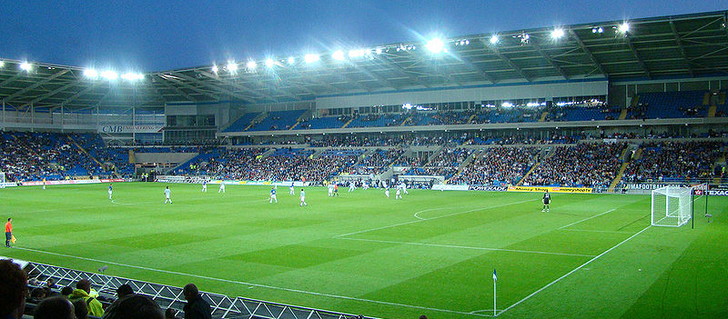
By joncandy [CC BY-SA 2.0]
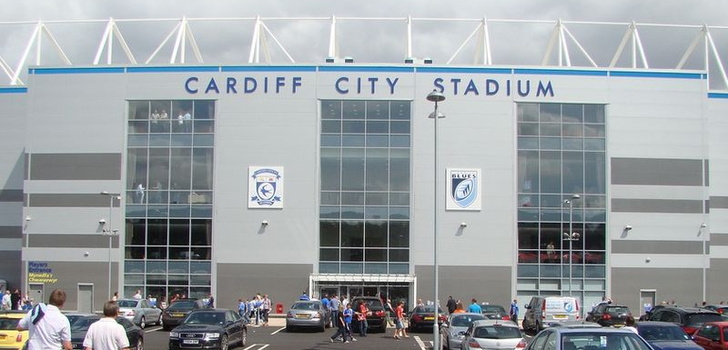
By joncandy/Jon Candy profile at Flickr website (Flickr original image) [CC BY-SA 2.0]

By Daicaregos (Own work) [CC BY-SA 3.0
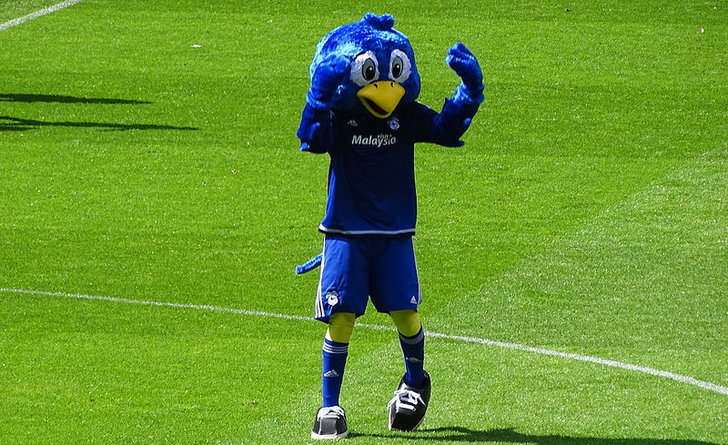
By Jon Candy from Cardiff
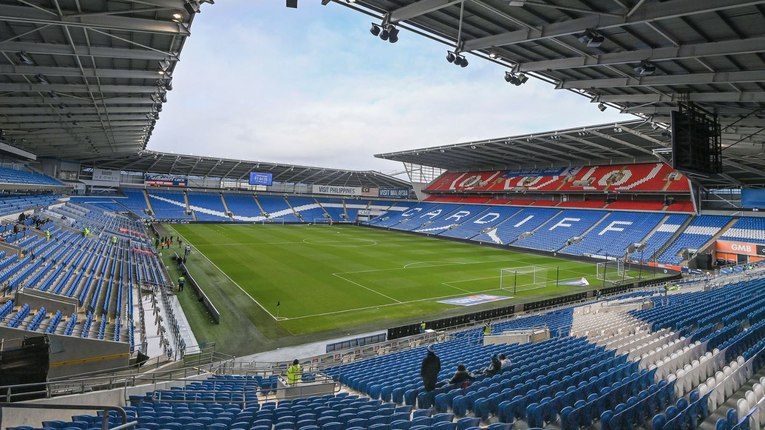
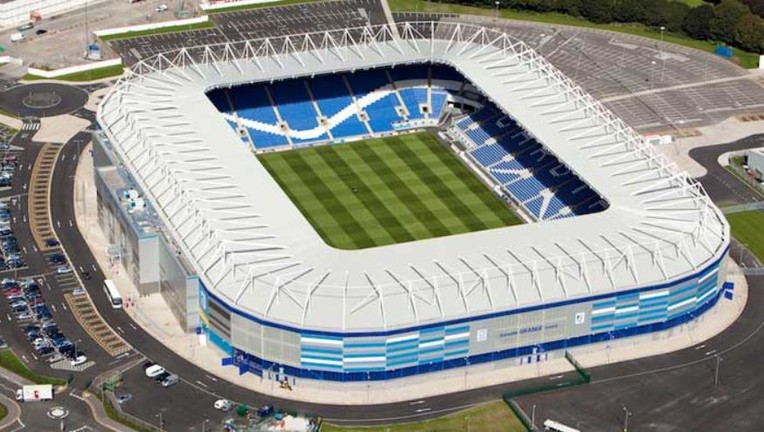
Cardiff City Stadium Seating Plan and Where to Sit
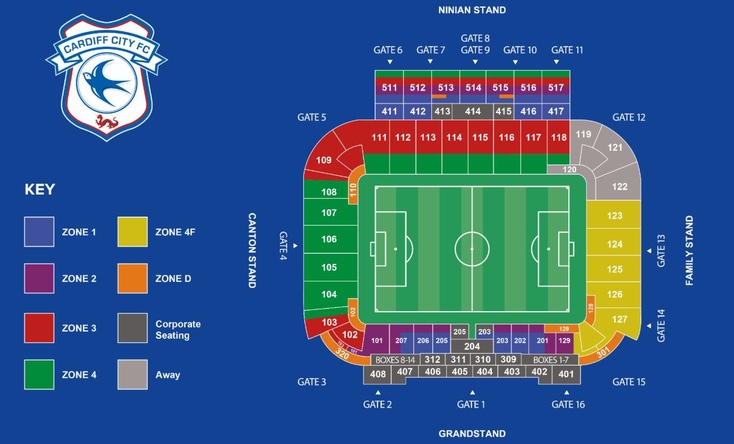
As is the case with pretty much any ground that has been built in the 21st century, Cardiff City Stadium eschews the more typically ‘British’ style of four independent stands in favour of a bowl shaped design. That’s not to say that the four sections of the ground don’t have their own personality, though, as we’ll explain here:
- The Canton Stand – Based behind the goal at the Northern end of the stadium, The Canton Stand is named after an area of the city close to the ground. This houses the club’s most vocal fans.
- The Grange Stand – Also known as the Family Stand, it sits directly opposite to The Canton Stand but a mirror image of it, this area of the ground normally plays host to the away fans in a small corner of it.
- The Ninian Stand – Named after Cardiff’s former home, which was itself named after Lieutenant-Colonel Lord Ninian Crichton-Stuart, this two-tiered stand runs along the side of the pitch.
- The Grandstand – This is the largest stand in the stadium and hosts facilities like the dressing rooms, dug-outs and the tunnel. The stand’s two-tiers are separated by a row of executive boxes.
Cardiff City Ticket Prices
On first viewing, Cardiff’s ticketing structure is a little complicated. The club categorises their matches into Bronze, Silver and Gold before further breaking down the ticket costs according to zones within the ground. If that wasn’t confusing enough there are then different prices for tickets depending on whether you buy them as an ‘Early Bird Member’, on general sale or on the match day itself.
Here are the cheapest and most expensive adult and concession ticket costs for each category as if you were buying them on the day. Should you buy them in advance you’ll get them a few pounds cheaper, and club members get them even cheaper than that.
- Gold: Adults – £24-£36 / Concessions – £20-£31
- Silver: Adults – £23-£34 / Concessions – £19-£29
- Bronze: Adults – £22-£32 / Concessions – £15-£27
How To Get Cardiff City Tickets
The club’s official website would be the first place to start if you’re hoping to pick up some tickets to see The Bluebirds play. There is an interactive seating map that lets you know how much availably there is for match tickets as well as how much they’ll cost, but you need to register with the site before you can see it. You can also speak to the club’s ticket office on their dedicated ticketing line or call in at the box office in person and ask them about the best seats they’ve got available.
Where to Buy
Getting To Cardiff City Stadium
Cardiff is the capital city of Wales, so it’s certainly easier to get there than other places. Here are the most common methods you’ll want to know about:
Train – Cardiff Central Railway Station is smack bang in the middle of the city and is easily accessed from London Paddington, Birmingham and most stations in the South-West of England. The ground itself is about a ten minute walk from Grangetown Station, reachable via a connecting train from Cardiff Central.
Bus – As well as numerous public buses that run from the centre of Cardiff out to the ground, there is also a shuttle bus that operates from Wood Street in the city centre out to Cardiff City Stadium. They run ever ten minutes from two hours before kick off and the return leg, which runs from the Fred Keenor statue, runs for up to an hour after the final whistle.
Car – If you’re thinking about driving to the ground then the M4 is the route you’ll want to take. Leave at Junction 33 and get on the A4232, exiting that onto the B4267 then follow the signs.
By Air – Cardiff International Airport is probably your best option if you’re hoping to fly in and see the Bluebirds as it’s only about ten miles from the city centre. If that doesn’t tickle your fancy, however, then Bristol Airport is about twenty odd miles away.
Taxi – If you didn’t want to bother waiting for buses or getting a connecting train then a taxi from Cardiff Central Railway Station out to the ground would take less than ten minutes and set you back close to £10. If you get caught in traffic then it will take longer and, you’d assume, cost more.
Parking Near Cardiff City Stadium
Parking at the ground itself is mostly reserved for season ticket holders, with the rest of the spaces being allocated on a first come, first served basis. There are a couple of unofficial parking areas close to the stadium and you might be able to park on a street not too far from the ground, too. Do be aware of parking restrictions in operation, though.
Useful Resources
- Parking - Just Park
Cardiff City Stadium Hotels
As the capital city of Wales it’s fair to say that there are a number of good hotel options in Cardiff. Oddly enough though, they are all around 20 minutes from the stadium. We’ve lined up some of our favourites for your consideration here:

Lincoln House - £55+
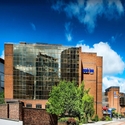
Park Inn by Radisson - £70+

Jolyons Boutique Hotel - £81+
Pubs and Bars Near Cardiff City Stadium
Cardiff is a great city to head to for a drink and a night out. It always offers a cracking atmosphere and because of the two major stadiums located in its boundary it is a city that is used to welcoming sports fans on a regular basis. Here are some of the best places to go for a bevvy or two:
Owain Glyndwr
The Lansdowne
Legends Club
Facilities
Having only been open since 2009, it’s fair to say that Cardiff City Stadium’s facilities are excellent in comparison to a number of other grounds in the UK. The concourses are wide and clean with numerous places to buy food and drink before the match.
Prices
- Programme: £3.5
- Pie: £3.9
- Cup of tea: £2
- Beer: £4.3
Hospitality
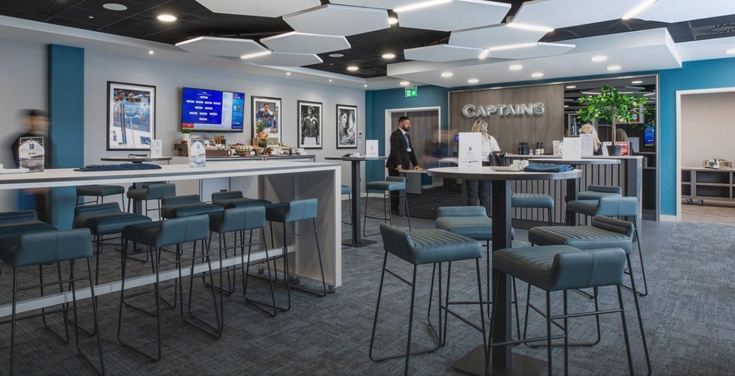
Vincent Tan, Cardiff City’s owner, knows what it takes to earn money both from and for his football club. For that reason the hospitality options at Cardiff City Stadium are numerous and extensive. Designed to meet the needs of business owners who are entertaining clients, companies that wish to reward their staff, or even just Bluebird fans who want to spoil themselves, you’re sure to have a great day in one of the hospitality lounges. Here are just some of your options:
- Ricoh Diamond Live – Five star treatment awaits, coming with the best padded seats in the stadium, pre-match 3 course meal, a club legend hosting your day, access to the man of the match presentation, complimentary refreshments, and lots more.
- The Captains Lounge – Adorned with pictures of Cardiff’s most iconic captains through the club’s history, your VIP experience here includes a three-course meal, free drink on arrival, a pre-match appearance from a first team player and hosting by two club legends. You’ll also enjoy half-time refreshments, a pay bar facility and padded seats right on the halfway line.
- Match Day Box – The ultimate experience in privacy, a match day box will offer you a private, glass-fronted suite for up to ten guests, Diamond level seating that you’ll have direct access to, privately served food and a selection of fine wines available for purchase.
Private Hire
The club has a number of spaces available to hire out for private events. From the Ricoh Suite that can host up to 600 people down to executive boxes that are ideal for breakout meetings, there is unlikely to be an event you’d like to hold that the club won’t be able to cater for.
Stadium Tours & Museum
You can tour Cardiff City Stadium for £35 in groups of 2-6, and if there are more of you than that it will be an extra £7 per person. The tour lasts about an hour and is not available on match days. It takes in all four levels of the ground, and you’ll see such sites as the club’s hospitality lounges, the boardroom, the press room, home and away changing rooms and the pitch. Like all good capitalist ventures, the tour finishes inside the club’s shop, giving you ample time to spend money on official merchandise.
At the time of writing there isn’t a museum specifically aimed at celebrating the rich history of Cardiff City Football Club. However, The Cardiff Story Museum in the town centre occasionally hosts exhibitions in which you’ll be able to see some club memorabilia and re-live their most famous moments.
About Cardiff City
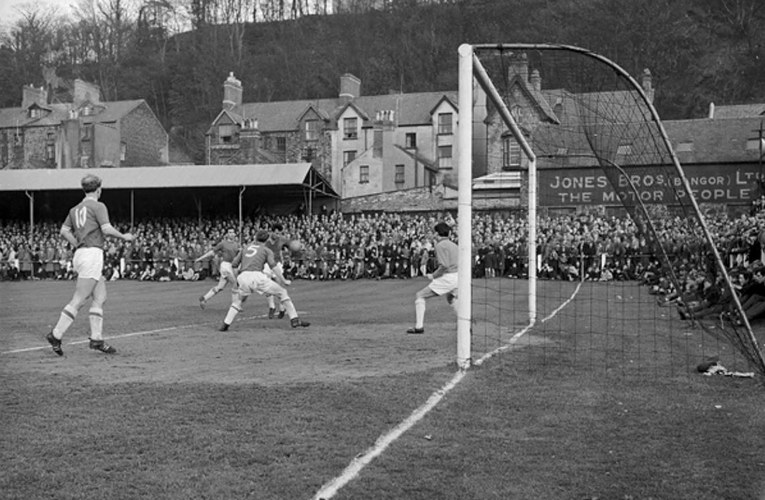
Cardiff City Football Club was founded in 1899 as Riverside AFC, a club designed to help keep the players from Riverside Cricket Club in shape during the cricketing off-season. They are the only non-English side to have won the FA Cup, something they achieved in 1927 and nearly did again in 2008, narrowly missing out when they lost 1-0 to Portsmouth. They also missed out on winning the League Cup in 2012 when they were beaten by Liverpool on penalties.
Ever since 1908 the club’s home colours have been blue and white, a fact which earned them the nickname ‘The Bluebirds’. The current owner, Vincent Tan, went against tradition for several years between 2012 and 2015 when he made them play in red when they were at home. This did not go down well at all with the club’s fans and Tan finally bowed to public pressure when he allowed the club to revert to its normal colours in 2015.
Cardiff City Stadium History
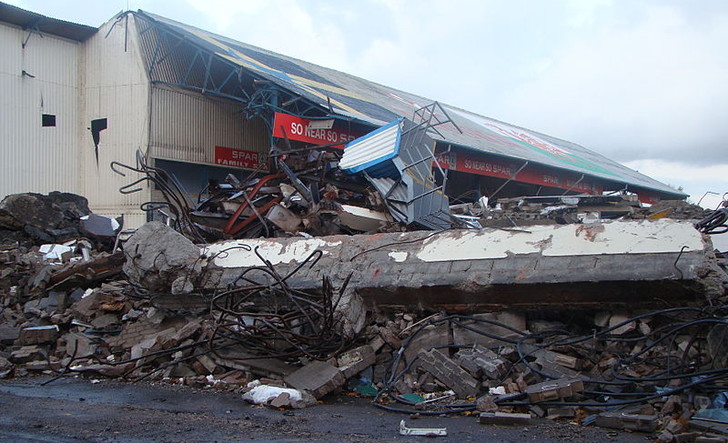
Opening in 2009 as a replacement for the club’s former ground, Ninian Park, Cardiff City Stadium doesn’t have a huge amount of history of its own to speak of. Most of the stories surrounding the ground are more to do with the difficulties encountered when trying to build it than in the games that have taken place on the pitch. Considering that permission for a new stadium was initially granted in January of 2002 yet ground wasn’t broken for its construction until September 2007, it’s fair to say there’s an interesting tale to be told in there somewhere!
The history of Cardiff City Stadium is yet to be written, with both the city’s main football club and the Wales national team using it as their base of operations. It was the home of Cardiff Blues rugby union team for a time and also hosted the 2011 Amlin Challenge Cup Final between Harlequins and Stade Francais. It has also hosted concerts by the Welsh band Stereophonics and Bon Jovi, amongst others.
Future Developments

The recent addition of a second tier to The Ninian Stand means that there is unlikely to be any further expansion to the ground in the near future; especially when you consider that the second-tier remained closed for the 2015-2016 season owing to poor ticket sales. The stadium can be expanded to up to 60,000 seats, but unless Cardiff become a major European force this is unlikely to happen any time soon.
